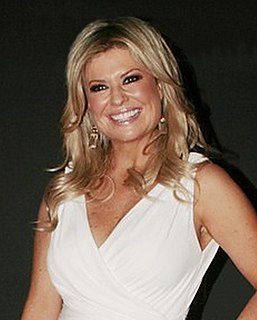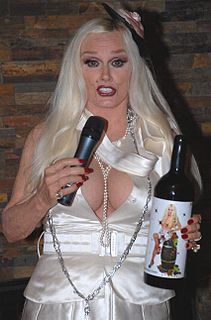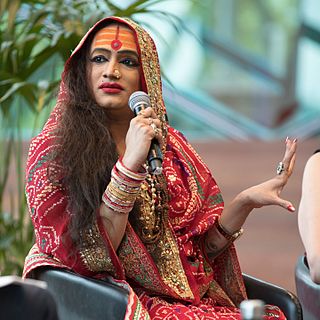A Quote by Melissa Gira Grant
Once when I told sex workers about my own sex work, it ended up building inappropriate trust with some people. But there have been events now - like covering the protests against Backpage at the Village Voice - where I've talked to sex workers who don't necessarily know that I've done sex work.
Related Quotes
I think sex work gets over-mystified and overcomplicated because it's about sexuality, and women's sexuality in general. What strikes me when I look at sex worker organizations and sex worker movements, in the US especially, is that they're so in alignment with other longstanding progressive causes. If anything, sex workers have been at the forefront of some of these causes. There have always been sex workers at the forefront of social movements.
In your thirties, you're much more comfortable with sex. First of all, sex is something you've done more. You know you can have sex just to have sex; you can have sex with friends; you can have sex with people you love; you can have sex with people you don't like, but the sex is good. And you can joke about sex much more.
I respect people who come forward and speak, but I'm not asking most of the sex workers I interview now about their work. I'm asking them about their lives in general or their political organizing. I take pains source things pointing back to intellectual work that sex workers have produced, because that's really absent.
Most of the time, people are not actually concerned with prostitution and sex work. They're concerned about seeing people who they think are prostitutes and sex workers in their community. Sometimes this just comes down to profiling, the feeling of "I don't want someone who looks like that in my neighborhood." We need communities and neighbors to regard sex workers as part of the community and fellow neighbors. But that's really difficult. There's certainly nothing supporting that.
Sex workers are the last women police stand in to protect. Sex workers are the last people that room is made for in many ways. You get a different kind of feminism if you put people at the margins at the center. It's a recently resonant lesson, but black feminists have been saying this for decades. Now when I talk to people engaged in sex workers' rights advocacy and people who identify as intersectional feminists, this is the air they breathe. We can't just make feminism about improving the lives of all women. Because there is no such thing as all women and universal female experience.
After being alive, the next hardest work is having sex. Of course, for some people it isn't work because they need the exercise and they've got the energy for the sex and the sex gives them even more energy. Some people get energy from sex and some people lose energy from sex. I have found that it's too much work. But if you have the time for it, and if you need that exercise-then you should do it.
I've moved away from writing about and describing actual experiences of sex work, whether mine or anybody else's, because the culture is obsessed with the behavior of sex workers. They want to figure out why they do what they do and who they are. What I'm trying to do is to shift the focus onto the producers of the anti-sex work discourse: the cops, the feminists, the anti-prostitution people. Those are the people whose behavior needs to change.
I hesitate talking about a program for change because we're in this moment where no one is listening to sex workers about how things should change. So I'm even speaking less as a former sex worker and more as a person trying to see the bigger picture that might be hard to see when you're doing sex work full-time, or running a social service organization, or doing all the things that a lot of sex worker activists are doing. It's hard work, and they don't necessarily get the time to step back and see the whole picture.
What shocked me was three different anti-prostitution feminists asking me to justify that I had been a sex worker, to prove it. That either I hadn't done enough sex work by their standards, or I hadn't done the right kind in order to have the right to speak about it. I couldn't understand them. I'm not speaking for you. I'm not speaking "for" anyone. I'm trying to put together this picture of the different forces that are producing a result in the lives of sex workers. You can't contest the fact that tons of people are going to jail and experiencing violence.
I was groomed as a so-called sex symbol, a rival to Marilyn Monroe, and from then on, whenever my picture appeared in paper, it was 'sex kitten,' 'sex symbol,' 'sex goddess,' 'sex pot.' I've accepted it, and I'm flattered, but in some ways, it's been a hindrance to me because I haven't been able to be taken seriously as an actress.
We're missing a lot of the real-life stories of what people's work looks like. Those are the people that I want sitting on the zoning board meetings, on the zoning commissions. Those are the people I want participating in business improvement in their own industry. The gentrification processes that often happen in cities so often manifest in street sweeps of sex workers. How do you get sex workers on neighborhood associations, regarded as members of the neighborhood?
I advocate for people who believe sex work is work. But women have so many avenues open. In the same way, a trans woman or a hijra should have that many doors open. If later on she chooses sex work, that's fine. But she shouldn't have to choose sex work because all the other doors are closed. Every hijra or trans person is not a sex worker. We need our own respect. And whoever chooses sex work after having all doors open, I really respect that.

























